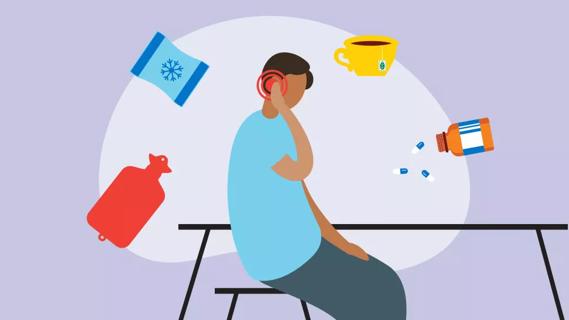Advertisement
Why you shouldn’t pop a pimple on your nose or near your mouth

When you think of things shaped like a triangle, what do you think of? You may begin imagining tortilla chips, yield signs and protractors… But probably not your face, right? When it comes to your health, though, there’s one triangle you shouldn’t be obtuse about.
Advertisement
Cleveland Clinic is a non-profit academic medical center. Advertising on our site helps support our mission. We do not endorse non-Cleveland Clinic products or services. Policy
The section of your face from the bridge of your nose to the corners of your mouth is sometimes known as the “danger triangle of the face,” or even the “triangle of death.” And it’s one place where you should never pop a pimple, as it can lead to an infection in your brain.
Dermatologist Alok Vij, MD, explains why the danger triangle poses such risks and how to avoid complications.
Think of this small segment of your face as a direct line to your brain. That’s thanks to your cavernous sinus, a network of large veins located behind your eye sockets. Through this sinus, blood drains from your brain.
An infection in the danger triangle — like from a picked pimple, or a nose piercing gone wrong — has a small but not impossible chance of traveling from your face right to your brain, without much distance to cover between them.
“There is the possibility for a facial infection to become an infection that impacts the rest of your body,” Dr. Vij says.
Don’t panic: You’re probably not going to die from popping a pimple on your nose. But technically speaking, it’s possible.
“Thankfully, it’s relatively unlikely,” Dr. Vij says, “but whenever there’s a violation of the skin and interaction with bacteria, there’s always a possibility for infection, which can lead to greater health concerns.”
Advertisement
In very rare cases, an infection of the face can lead to septic cavernous sinus thrombosis, a blood clot in your cavernous sinus. This can then cause a variety of serious and potentially life-threatening health issues, including:
Septic cavernous sinus thrombosis used to be an almost certain death sentence, but thanks to antibiotics, it’s now typically treatable as long as it’s caught in time.
“Honestly, you should always avoid popping pimples,” Dr. Vij advises. “Doing so can lead to inflammation, post-inflammatory hyperpigmentation and scarring — and, of course, infection.”
And you should especially avoid popping a pimple in the danger triangle, lessening your chances of an infection that spreads farther. It can be hard to resist the urge to pick, but it’s best to let zits run their course.
If you’re feeling antsy or have a big event coming up, though, try these no-pick tips for safely getting rid of pimples in the danger triangle:
If you have an infection on your face, monitor it closely and pay attention to your overall health for any significant changes in the way you feel, especially within five to 10 days of the start of the infection.
“The infection may start to get bigger, spreading to cover more of an area,” Dr. Vij says, “and you may start to feel more systemically ill — a fever, shaking, chills. If this starts to happen, see a doctor as soon as you can for diagnosis and treatment.”
Advertisement
Learn more about our editorial process.
Advertisement

An ice pack and acetaminophen can help tame initial discomfort

Causes can include dry skin, eczema, psoriasis, sunburn and fungal infections

Your skin can be either dry, oily, normal, combination or sensitive — and knowing which kind you have can help you take care of it

These chemicals, found in products like shampoo, shaving cream and processed foods, may affect your health

Check the plastic and personal care products in your home for these hormone-disrupting chemicals

Taking supplements with biotin can cause inaccurate lab test results

They may seem cute, but toxins released by certain kinds of caterpillars can leave you feeling itchy or worse

Wash your bath towels at least once a week, and washcloths at least twice a week

Not all ear infections need antibiotics — cold and warm compresses and changing up your sleep position can help

A glass of lemon water in the morning can help with digestion and boost vitamin C levels, and may even help get you into a better routine